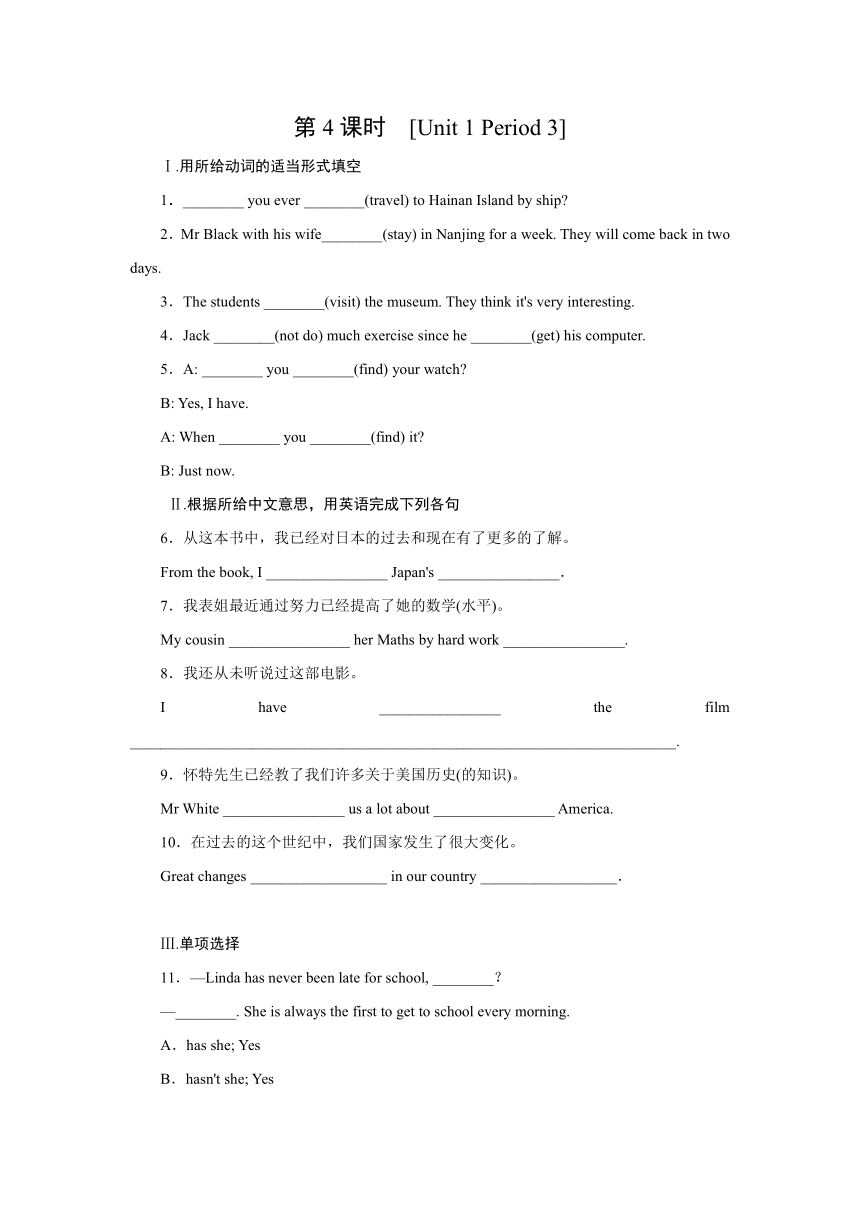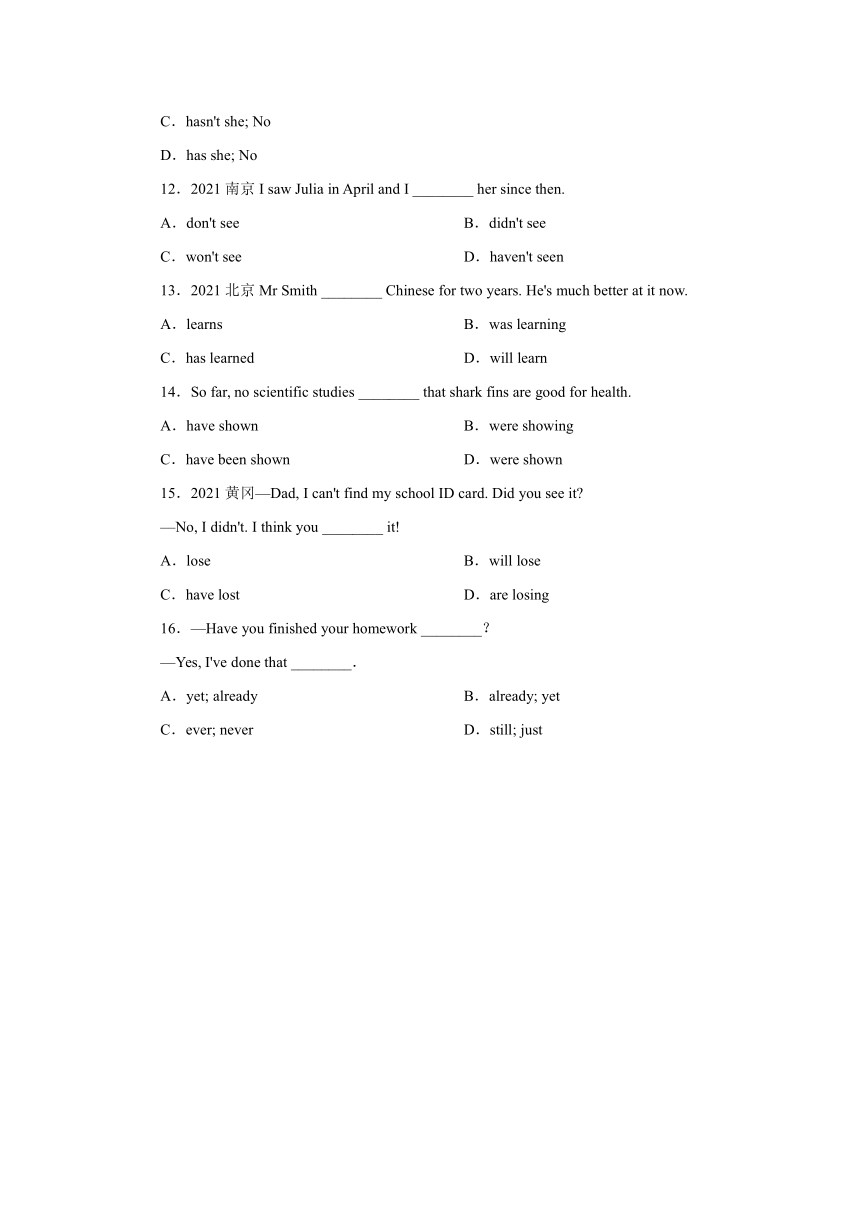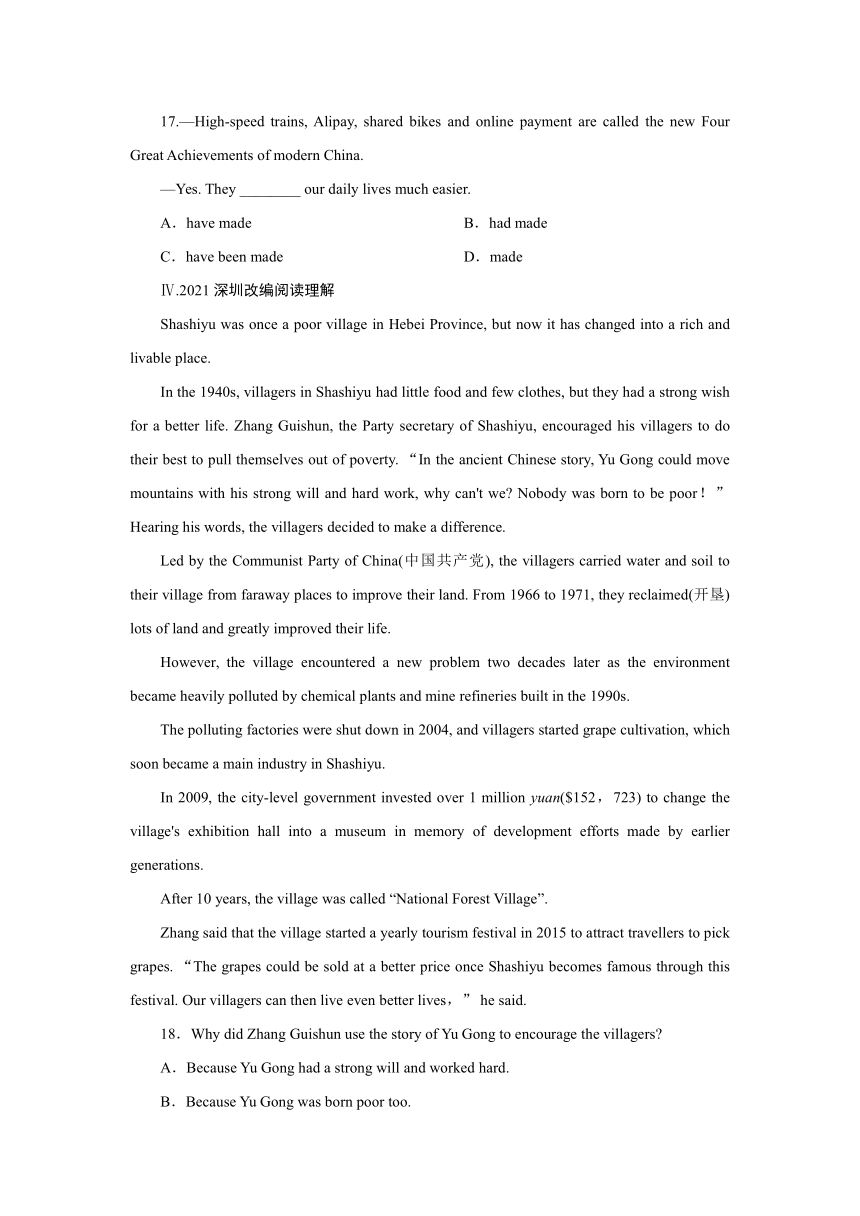牛津译林版八年级下册Unit 1 Past and present Period 3课课练(word版,含答案)
文档属性
| 名称 | 牛津译林版八年级下册Unit 1 Past and present Period 3课课练(word版,含答案) |  | |
| 格式 | docx | ||
| 文件大小 | 43.1KB | ||
| 资源类型 | 教案 | ||
| 版本资源 | 牛津译林版 | ||
| 科目 | 英语 | ||
| 更新时间 | 2022-07-20 11:14:28 | ||
图片预览



文档简介
第4课时 [Unit 1 Period 3]
Ⅰ.用所给动词的适当形式填空
1.________ you ever ________(travel) to Hainan Island by ship
2.Mr Black with his wife________(stay) in Nanjing for a week. They will come back in two days.
3.The students ________(visit) the museum. They think it's very interesting.
4.Jack ________(not do) much exercise since he ________(get) his computer.
5.A: ________ you ________(find) your watch
B: Yes, I have.
A: When ________ you ________(find) it
B: Just now.
Ⅱ.根据所给中文意思,用英语完成下列各句
6.从这本书中,我已经对日本的过去和现在有了更多的了解。
From the book, I ________________ Japan's ________________.
7.我表姐最近通过努力已经提高了她的数学(水平)。
My cousin ________________ her Maths by hard work ________________.
8.我还从未听说过这部电影。
I have ________________ the film ________________________________________________________________________.
9.怀特先生已经教了我们许多关于美国历史(的知识)。
Mr White ________________ us a lot about ________________ America.
10.在过去的这个世纪中,我们国家发生了很大变化。
Great changes __________________ in our country __________________.
Ⅲ.单项选择
11.—Linda has never been late for school, ________?
—________. She is always the first to get to school every morning.
A.has she; Yes
B.hasn't she; Yes
C.hasn't she; No
D.has she; No
12.2021南京I saw Julia in April and I ________ her since then.
A.don't see B.didn't see
C.won't see D.haven't seen
13.2021北京Mr Smith ________ Chinese for two years. He's much better at it now.
A.learns B.was learning
C.has learned D.will learn
14.So far, no scientific studies ________ that shark fins are good for health.
A.have shown B.were showing
C.have been shown D.were shown
15.2021黄冈—Dad, I can't find my school ID card. Did you see it
—No, I didn't. I think you ________ it!
A.lose B.will lose
C.have lost D.are losing
16.—Have you finished your homework ________?
—Yes, I've done that ________.
A.yet; already B.already; yet
C.ever; never D.still; just
17.—High speed trains, Alipay, shared bikes and online payment are called the new Four Great Achievements of modern China.
—Yes. They ________ our daily lives much easier.
A.have made B.had made
C.have been made D.made
Ⅳ.2021深圳改编阅读理解
Shashiyu was once a poor village in Hebei Province, but now it has changed into a rich and livable place.
In the 1940s, villagers in Shashiyu had little food and few clothes, but they had a strong wish for a better life. Zhang Guishun, the Party secretary of Shashiyu, encouraged his villagers to do their best to pull themselves out of poverty. “In the ancient Chinese story, Yu Gong could move mountains with his strong will and hard work, why can't we Nobody was born to be poor!” Hearing his words, the villagers decided to make a difference.
Led by the Communist Party of China(中国共产党), the villagers carried water and soil to their village from faraway places to improve their land. From 1966 to 1971, they reclaimed(开垦) lots of land and greatly improved their life.
However, the village encountered a new problem two decades later as the environment became heavily polluted by chemical plants and mine refineries built in the 1990s.
The polluting factories were shut down in 2004, and villagers started grape cultivation, which soon became a main industry in Shashiyu.
In 2009, the city level government invested over 1 million yuan($152,723) to change the village's exhibition hall into a museum in memory of development efforts made by earlier generations.
After 10 years, the village was called “National Forest Village”.
Zhang said that the village started a yearly tourism festival in 2015 to attract travellers to pick grapes. “The grapes could be sold at a better price once Shashiyu becomes famous through this festival. Our villagers can then live even better lives,” he said.
18.Why did Zhang Guishun use the story of Yu Gong to encourage the villagers
A.Because Yu Gong had a strong will and worked hard.
B.Because Yu Gong was born poor too.
C.Because the villagers worshiped Yu Gong.
D.Because Yu Gong became rich at last.
19.From 1966 to 1971, what did the villagers do to improve their living situation
A.They planted grapes to earn money.
B.They carried water and soil to their village to improve their land.
C.They moved to another place to live a better life.
D.They built a lot of factories.
20.Which word can be used to describe the villagers
A.Hard working. B.Lazy. C.Kind hearted. D.Stupid.
21.When was Shashiyu called “National Forest Village”?
A.In 2009. B.In 2004. C.In 2015. D.In 2019.
22.Where can you probably read the passage
A.In a storybook.
B.In a newspaper.
C.In a sports magazine.
D.In a science book.
答案
Ⅰ.1.Have; travelled 2.has stayed
3.have visited 4.has not/hasn't done; got
5.Have; found; did; find
Ⅱ.6.have learned/learnt/known more about; past and present
7.has improved; recently
8.never heard about/of; yet
9.has taught; the history of
10.have taken place; over the past century
Ⅲ.11.D 现在完成时的反意疑问句。“琳达上学从未迟到过,是吗?”“是的。她每天早上总是第一个到达学校。”反意疑问句的构成方式:前否后肯,前肯后否。never表示否定意义,故反意疑问句的疑问部分应该用肯定形式,排除B、C项。根据答句句意可知,琳达从未迟到过,应用“No”表示否定,但需译为“是的”。
12.D 动词的时态。四月份我看到过茱莉亚,自那以后我再没见过她。由时间状语“since then”可知用现在完成时。
13.C 现在完成时。史密斯先生已经学习汉语两年了。他现在更擅长它了。根据“for two years”可知,用现在完成时态表示持续到现在的动作。
14.A 动词的时态。到目前为止,还没有科学研究表明鲨鱼鳍对健康有好处。根据句中标志性时间状语“so far”可知用现在完成时。
15.C
16.A 副词辨析。“你做完你的家庭作业了吗?”“是的,我已经把它做完了。”yet意为“仍,还”,常用在否定句或疑问句中;already意为“已经”,常用于肯定句中;ever意为“曾经”;never意为“从不”;still意为“仍然”;just意为“刚才”。结合语境可知选A。
17.A
Ⅳ.本文是一篇记叙文,主要讲述了沙石峪村如何从贫穷的小农村变成富裕且充满生机的地方的故事。
18.A 根据第二段中的“In the ancient Chinese story, Yu Gong could move mountains with his strong will and hard work, why can't we Nobody was born to be poor!”可知,愚公移山靠的就是他强大的毅力与努力,因此,这里的村民可以学习愚公的这些精神,帮助自己摆脱贫穷。
19.B 根据第三段中的“Led by the Communist Party of China, the villagers carried water and soil to their village from faraway places to improve their land. From 1966 to 1971, they reclaimed lots of land and greatly improved their life.”可知,从1966年到1971年,村民是通过把水和土壤从很远的地方搬运过来来改善土壤问题的。
20.A 21.D
22.B 主旨大意题。根据全文内容可知,这是对一个村庄建设的报道,里面有大量的时间、数字及采访内容,故最有可能来自报纸。
Ⅰ.用所给动词的适当形式填空
1.________ you ever ________(travel) to Hainan Island by ship
2.Mr Black with his wife________(stay) in Nanjing for a week. They will come back in two days.
3.The students ________(visit) the museum. They think it's very interesting.
4.Jack ________(not do) much exercise since he ________(get) his computer.
5.A: ________ you ________(find) your watch
B: Yes, I have.
A: When ________ you ________(find) it
B: Just now.
Ⅱ.根据所给中文意思,用英语完成下列各句
6.从这本书中,我已经对日本的过去和现在有了更多的了解。
From the book, I ________________ Japan's ________________.
7.我表姐最近通过努力已经提高了她的数学(水平)。
My cousin ________________ her Maths by hard work ________________.
8.我还从未听说过这部电影。
I have ________________ the film ________________________________________________________________________.
9.怀特先生已经教了我们许多关于美国历史(的知识)。
Mr White ________________ us a lot about ________________ America.
10.在过去的这个世纪中,我们国家发生了很大变化。
Great changes __________________ in our country __________________.
Ⅲ.单项选择
11.—Linda has never been late for school, ________?
—________. She is always the first to get to school every morning.
A.has she; Yes
B.hasn't she; Yes
C.hasn't she; No
D.has she; No
12.2021南京I saw Julia in April and I ________ her since then.
A.don't see B.didn't see
C.won't see D.haven't seen
13.2021北京Mr Smith ________ Chinese for two years. He's much better at it now.
A.learns B.was learning
C.has learned D.will learn
14.So far, no scientific studies ________ that shark fins are good for health.
A.have shown B.were showing
C.have been shown D.were shown
15.2021黄冈—Dad, I can't find my school ID card. Did you see it
—No, I didn't. I think you ________ it!
A.lose B.will lose
C.have lost D.are losing
16.—Have you finished your homework ________?
—Yes, I've done that ________.
A.yet; already B.already; yet
C.ever; never D.still; just
17.—High speed trains, Alipay, shared bikes and online payment are called the new Four Great Achievements of modern China.
—Yes. They ________ our daily lives much easier.
A.have made B.had made
C.have been made D.made
Ⅳ.2021深圳改编阅读理解
Shashiyu was once a poor village in Hebei Province, but now it has changed into a rich and livable place.
In the 1940s, villagers in Shashiyu had little food and few clothes, but they had a strong wish for a better life. Zhang Guishun, the Party secretary of Shashiyu, encouraged his villagers to do their best to pull themselves out of poverty. “In the ancient Chinese story, Yu Gong could move mountains with his strong will and hard work, why can't we Nobody was born to be poor!” Hearing his words, the villagers decided to make a difference.
Led by the Communist Party of China(中国共产党), the villagers carried water and soil to their village from faraway places to improve their land. From 1966 to 1971, they reclaimed(开垦) lots of land and greatly improved their life.
However, the village encountered a new problem two decades later as the environment became heavily polluted by chemical plants and mine refineries built in the 1990s.
The polluting factories were shut down in 2004, and villagers started grape cultivation, which soon became a main industry in Shashiyu.
In 2009, the city level government invested over 1 million yuan($152,723) to change the village's exhibition hall into a museum in memory of development efforts made by earlier generations.
After 10 years, the village was called “National Forest Village”.
Zhang said that the village started a yearly tourism festival in 2015 to attract travellers to pick grapes. “The grapes could be sold at a better price once Shashiyu becomes famous through this festival. Our villagers can then live even better lives,” he said.
18.Why did Zhang Guishun use the story of Yu Gong to encourage the villagers
A.Because Yu Gong had a strong will and worked hard.
B.Because Yu Gong was born poor too.
C.Because the villagers worshiped Yu Gong.
D.Because Yu Gong became rich at last.
19.From 1966 to 1971, what did the villagers do to improve their living situation
A.They planted grapes to earn money.
B.They carried water and soil to their village to improve their land.
C.They moved to another place to live a better life.
D.They built a lot of factories.
20.Which word can be used to describe the villagers
A.Hard working. B.Lazy. C.Kind hearted. D.Stupid.
21.When was Shashiyu called “National Forest Village”?
A.In 2009. B.In 2004. C.In 2015. D.In 2019.
22.Where can you probably read the passage
A.In a storybook.
B.In a newspaper.
C.In a sports magazine.
D.In a science book.
答案
Ⅰ.1.Have; travelled 2.has stayed
3.have visited 4.has not/hasn't done; got
5.Have; found; did; find
Ⅱ.6.have learned/learnt/known more about; past and present
7.has improved; recently
8.never heard about/of; yet
9.has taught; the history of
10.have taken place; over the past century
Ⅲ.11.D 现在完成时的反意疑问句。“琳达上学从未迟到过,是吗?”“是的。她每天早上总是第一个到达学校。”反意疑问句的构成方式:前否后肯,前肯后否。never表示否定意义,故反意疑问句的疑问部分应该用肯定形式,排除B、C项。根据答句句意可知,琳达从未迟到过,应用“No”表示否定,但需译为“是的”。
12.D 动词的时态。四月份我看到过茱莉亚,自那以后我再没见过她。由时间状语“since then”可知用现在完成时。
13.C 现在完成时。史密斯先生已经学习汉语两年了。他现在更擅长它了。根据“for two years”可知,用现在完成时态表示持续到现在的动作。
14.A 动词的时态。到目前为止,还没有科学研究表明鲨鱼鳍对健康有好处。根据句中标志性时间状语“so far”可知用现在完成时。
15.C
16.A 副词辨析。“你做完你的家庭作业了吗?”“是的,我已经把它做完了。”yet意为“仍,还”,常用在否定句或疑问句中;already意为“已经”,常用于肯定句中;ever意为“曾经”;never意为“从不”;still意为“仍然”;just意为“刚才”。结合语境可知选A。
17.A
Ⅳ.本文是一篇记叙文,主要讲述了沙石峪村如何从贫穷的小农村变成富裕且充满生机的地方的故事。
18.A 根据第二段中的“In the ancient Chinese story, Yu Gong could move mountains with his strong will and hard work, why can't we Nobody was born to be poor!”可知,愚公移山靠的就是他强大的毅力与努力,因此,这里的村民可以学习愚公的这些精神,帮助自己摆脱贫穷。
19.B 根据第三段中的“Led by the Communist Party of China, the villagers carried water and soil to their village from faraway places to improve their land. From 1966 to 1971, they reclaimed lots of land and greatly improved their life.”可知,从1966年到1971年,村民是通过把水和土壤从很远的地方搬运过来来改善土壤问题的。
20.A 21.D
22.B 主旨大意题。根据全文内容可知,这是对一个村庄建设的报道,里面有大量的时间、数字及采访内容,故最有可能来自报纸。
